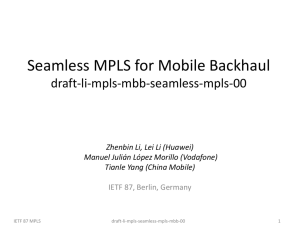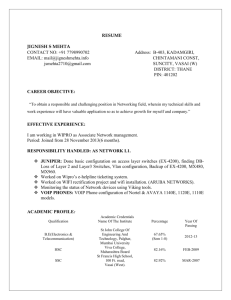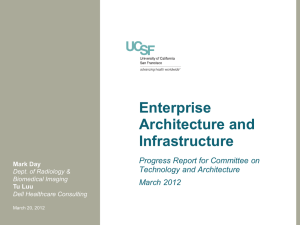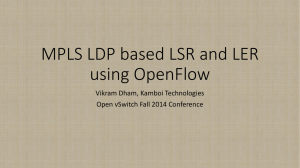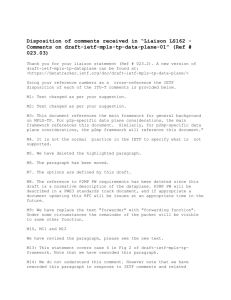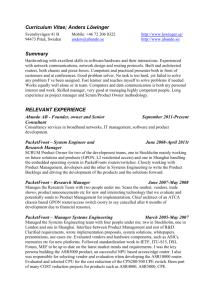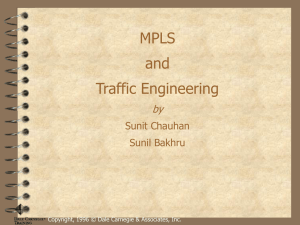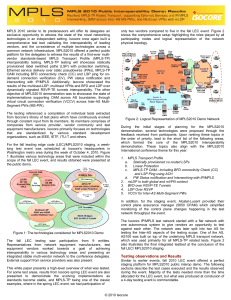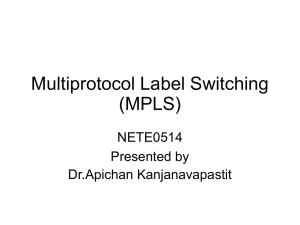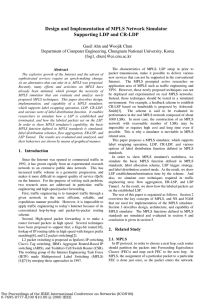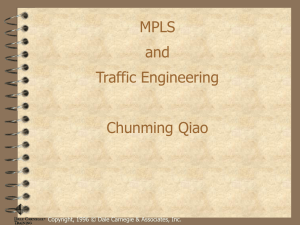The key concepts for Seamless MPLS
advertisement
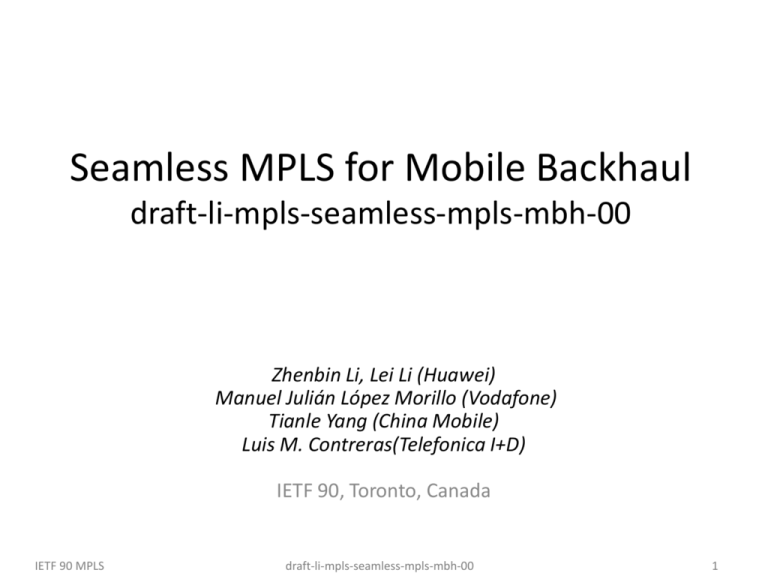
Seamless MPLS for Mobile Backhaul draft-li-mpls-seamless-mpls-mbh-00 Zhenbin Li, Lei Li (Huawei) Manuel Julián López Morillo (Vodafone) Tianle Yang (China Mobile) Luis M. Contreras(Telefonica I+D) IETF 90, Toronto, Canada IETF 90 MPLS draft-li-mpls-seamless-mpls-mbh-00 1 Updates Change the draft name from draft-li-mpls-seamless-mpls-mbb00 to draft-li-mpls-seamless-mpls-mbh-00 Add one co-author: Luis from Telefonica I+D Remove the solutions for seamless MPLS for mobile backhaul network. Please refer to the related solutions drafts. Add detailed problem statement and define corresponding requirements. Correct text errors. IETF 90 MPLS draft-li-mpls-seamless-mpls-mbh-00 2 Seamless MPLS Network Architecture Access Aggregation Core IS-IS L2 RR LDP IS-IS L1 LDP Static Route LDP DoD AGN Aggregation LSr ABR IBGP LSR IBGP IS-IS L1 LDP ABR IBGP LSR Access Static Route LDP DoD AGN IBGP AN AN AGN LSR ABR ISIS ABR Loop-Back LSR ABR LSR AGN ISIS ABR Loop-Back The key concepts for Seamless MPLS: Decoupling the transport layer and service layer. The network will be divided into multiple IGP areas for access, aggregation and core network IBGP run among the Area Boarder Routers (ABRs) to advertise labeled route. LDP DoD is introduced to set up LSP on demand between AN and AGN. IETF 90 MPLS draft-li-mpls-seamless-mpls-mbh-00 3 Seamless MPLS for Mobile Backhaul Networks Ring topology is adopted in mobile backhaul networks. Variable devices with variable capability are deployed in the access ring and aggregation ring. L3VPN and TE propose new requirements on Seamless MPLS architecture. Last Mile Access Aggregation Core CSG BSC CSG RSG ASG BTS CSG S-GW/MME NodeB CSG CSG ASG RSG eNB RNC Service Layer L2/L3 Services Hierarchical BGP LSP Transport Layer IETF 90 MPLS Next-Hop self Next-Hop self BGP LSP LDP/TE LSP draft-li-mpls-seamless-mpls-mbh-00 4 Scenarios for Network Architecture Network Architecture 1: Network separated by Ases Scenario 1: ASes connected by different ASBRs Scenario 2: ASes connected by integrated ASBRs Different network integrated in one AS but separated by different IGP areas IETF 90 MPLS draft-li-mpls-seamless-mpls-mbh-00 5 Scenarios for Different Edge of Labeled BGP Scenario 1: Cell Site/User PE devices as the edge Scenario 2: ASG nodes as the edge Scenario 3: RSG(ASBR) devices as the edge IETF 90 MPLS draft-li-mpls-seamless-mpls-mbh-00 6 Scalability problems and requirements Problem statement Tunnel/LSP Configuration a set of TE attributes configuration at the ingress node Path Constraints Configuration Return Path Issue of BFD for MPLS LSPs Completely disjointed primary and backup LSP Avoid passing through different access rings Requirements REQ 01:Auto tunnel mechanism REQ 02: cope with the return path issue of BFD REQ 03: completely disjointed primary and backup LSP REQ 04: avoid traffic passing through different access rings IETF 90 MPLS draft-li-mpls-seamless-mpls-mbh-00 7 End-to-End Transport problems and requirements Problem statement Proxy Egress MPLS TE LSP Actual destination may be not located in the local MBH network set up the proxy egress MPLS TE LSP from CSG to stitching point Multi-hop LDP DoD cannot configure the default route for setup of LDP DoD LSP troublesome to configure static routes to a specific destination on all node Requirements REQ 11:set up MPLS TE proxy egress LSP to stitch with BGP LSP REQ 12:simplify route configuration to setup multi-hop LDP DoD LSP IETF 90 MPLS draft-li-mpls-seamless-mpls-mbh-00 8 Hierarchical Service Bearing problems and requirements Problem statement Owing to the limited capability of access nodes it may be necessary to introduce hierarchical MPLS-based service bearing Seamless MPLS is to provide more flexibility for MPLS-based service bearing. Requirements REQ 31: hierarchical L3VPN solutions MAY be introduced REQ 32: hierarchical L2VPN solutions MAY be introduced IETF 90 MPLS draft-li-mpls-seamless-mpls-mbh-00 9 Reliability Transport problems and requirements Problem statement The route loop is common in the ring LFA can not avoid the route loop completely Remote-LFA has to set up LDP remote session and still faces the route loop challenges Requirements REQ41:Scalable IP/LDP FRR solutions SHOULD be provided for the purpose of 100% network coverage IETF 90 MPLS draft-li-mpls-seamless-mpls-mbh-00 10 Policy Control problems and requirements Problem statement Simple and dynamic BGP policy design and configuration BGP is asked to carry more information to help select routing more intelligently Requirements REQ51: BGP SHOULD be able to carry more information to facilitate the route policy control IETF 90 MPLS draft-li-mpls-seamless-mpls-mbh-00 11 OAM problems and requirements (1) Problem statement Layering OAM Framework for L3VPN Service The existing OAM mechanisms for IP and L3VPN is not sufficient to satisfy the OAM requirement of the mobile service, especially for performance monitoring IETF 90 MPLS draft-li-mpls-seamless-mpls-mbh-00 12 OAM problems and requirements (2) Problem statement Flat End-to-End OAM Mechanism Can not get the end-to-end path directly. Path of OAM packets and real traffic packets may be different Requirements REQ61: Performance monitoring mechanism for IP flow REQ62: Performance monitoring mechanism for the VPN flow REQ63: The end-to-end path trace mechanism for the IP flow IETF 90 MPLS draft-li-mpls-seamless-mpls-mbh-00 13 Next Steps • Solicit more comments and feedback • Incorporate more requirements and solutions • Revise the draft IETF 90 MPLS draft-li-mpls-seamless-mpls-mbh-00 14

